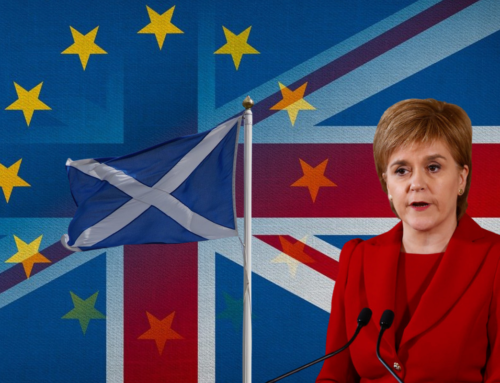By Brendan Donnelly
Director, The Federal Trust
23rd April 2018
Last week saw two potentially important developments in the continuing campaign against Brexit. There was a significant defeat for the government in the House of Lords on the subject of the Customs Union (CU); and a coalition of pro-European groups launched a campaign to bring about a “People’s Vote” on the terms of the EU withdrawal agreement negotiated by Mrs. May and her ministers. These can only be initial steps in a process over the coming six months whose outcome is unpredictable. The former trade minister, Lord Digby Jones, was sufficiently concerned to warn that “they will DESTROY Brexit” while anti-Brexit campaigners will certainly hope that this is one European issue on which he will turn out to be correct.
On the face of it, the amendment passed by peers is limited in its scope. It merely enjoins the government to report in the autumn separately and specifically on the progress it has made towards establishing or maintaining a CU between the UK and the EU. The government’s spokesman in the Lords made clear that the Prime Minister is still firmly set upon taking the UK out of it: there should therefore be nothing upon which the government can report in October. Much more important than the strict text of the amendment voted is the signal it sends that the House of Lords wants to be an active participant in the Brexit debate over the coming months. This may encourage the House of Commons to do likewise. Particularly striking in the House of Lords were the exchanges between the two former Conservative ministers, Lords Lawson and Patten, with the former accusing the latter of trying to wreck Brexit, and the latter insisting that he now saw it as his duty to put the interests of the country before those of his party. Lord Lawson may well be right in his accusation. Lord Patten for his part represents a significant majority of opinion among peers which is perfectly prepared to attack at least the modalities, and in many cases the whole principle of Brexit.
It will now be open to the Commons to reject, if it wishes, the peers’ proposal. There are, however, good reasons to believe that the great majority of Labour MPs are sympathetic to at least further discussion about the maintenance of British participation in a CU. In recent months it has become official Labour policy to speak much more approvingly of such a Union, not least for its capacity to facilitate trade within the island of Ireland. Equally, there is a sizeable minority of Conservative MPs uneasy about the economic damage and disruption that they fear British withdrawal from the CU may bring about. It is therefore entirely possible that an anti-government majority on this subject can be constructed in the Commons over the coming months. Only a few Conservative dissidents might be necessary to ensure this majority if Labour and other smaller parties vote solidly for continued CU membership.
There has been much speculation since the House of Lords vote that Mrs. May will or should pre-empt being outvoted in the Commons by abandoning or modifying her opposition to the CU. It has even been suggested by some commentators that she may be looking for an opportunity to retreat from this long-standing “red line” and the peers’ vote will facilitate that process. This may be to underestimate the emotional commitment of the most radical Eurosceptics in Mrs. May’s party to leaving the CU. For them it is an article of faith that “taking back control” dictates that the UK should be able to negotiate its own trading arrangements with third countries, freed from the constraints imposed by EU membership. If the Prime Minister wavers in her hostility to the CU, she will risk breaking the fragile truce between herself and the European Research Group (ERG.). The ERG has been willing to swallow much in the way of concessions during the Brexit negotiations. The CU would almost certainly be a bridge too far for them and their supporters in the Conservative mass media. Significantly, Mrs. May’s spokesman has now reiterated her unbending hostility to the UK’s remaining in or entering into a CU, despite some previous press comment implying a softening of her attitude.
Greater obstacle
While the voting in the House of Lords may well presage political difficulty for Mrs. May in the Commons this summer, the more important hurdle will only arise in the late autumn, when the overall withdrawal agreement with the EU is submitted to a “meaningful vote” by MPs. It is on this confrontation that the “People’s Vote” campaign is focussing, with a number of different pro-European organizations joining together on a cross-party basis to argue that the negotiated Brexit terms will be so different to what was promised during the 2016 referendum that the electorate deserve a chance to decide on the terms. The campaign has begun with an apparently well-financed advertising initiative, designed to emphasize that UK withdrawal is not yet an accomplished fact and that Parliament and people between them can still prevent it from happening. Campaigners believe, interestingly, that it will only be possible to persuade the electorate and MPs that a new referendum should be held when there is greater public awareness that such a referendum can be held in a manner and timeframe that can affect the Brexit process.
It is constitutionally indisputable that the Commons could pass legislation in the autumn to hold another referendum before the UK leaves the EU automatically at the end of March, 2019. Few commentators doubt that a substantial majority of MPs is opposed to Brexit, particularly the version Mrs. May’s government seems likely to pursue. Recently published studies by governmental departments reveal the scale of the economic harm that Brexit will inflict on the UK. Polls have suggested some movement of public opinion against Brexit over the past six months, while showing comfortable majorities in favour of holding a second referendum. On the face of it, the prospects for a new referendum late in 2018 or early in 2019 appear reasonable. There are, however, a number of barriers to the outcome sought by “People’s Vote,” some speciously administrative and others genuinely political.
It is sometimes argued by opponents of a further referendum that there would be no time for it to take place before March 2019, that it would be impossible for MPs to agree on the wording, or that a vote against the Brexit terms negotiated by the government would only lead to a yet more disruptive Brexit next spring. None of these arguments is persuasive. The rest of the EU would certainly allow a short extension of British membership beyond March to allow the referendum to take place; and whatever the precise wording of the referendum question it is inconceivable that Parliament would allow the government, having seen its terms for Brexit rejected, simply to await automatic British withdrawal in the most disruptive and damaging way possible. A European referendum lost by the government would change the whole tenor and direction of the Brexit debate. An attractive element of Sir Keir Starmer’s otherwise disappointing recent speeches has been his call for Parliament to take more control of the Brexit process. A referendum which rejected the proposed withdrawal agreement would certainly accomplish that.
Shifting sands
Much more threatening to the prospect of a new referendum is the current paradoxical political landscape. The overwhelming majority of Labour MPs would happily see a further referendum take place and a significant minority of Conservative MPs would agree with them. The Labour Party is, however, led by a long-term opponent of British membership, Jeremy Corbyn, who loses no opportunity to reaffirm his commitment to carrying out what he regards as the unalterable decision of the referendum in 2016. The Conservative Party for its part is led by a Prime Minister who argued for the UK to Remain and has refused ever since to say that she has changed her mind. Because she has no overall majority, she finds herself particularly dependent upon the well-organized and determined radical Eurosceptic minorities of the ERG and the Democratic Unionists from Northern Ireland. There is an ironic congruence of interest between these minorities and Mr Corbyn. He and they have diametrically opposed preferences for the social and economic future of the UK outside the EU but agree they can pursue these more easily outside the Union. In a yet further deepening of the paradox, the uniquely alarming prospect of Mr Corbyn as Prime Minister dissuades many moderate Conservative MPs from destabilizing their party by pro-European rebellion.
Against this complicated and self-contradictory political background, the odds on whether there will be a new referendum before March 2019 cannot be plausibly assessed. If, as is entirely possible, there is no agreement between Mrs. May’s government and the EU, it is difficult to imagine the Commons remaining a simply passive spectator as the prospect looms of a catastrophic Brexit in March. If public opinion hardens against Brexit over the coming months, that might well be sufficient to encourage Labour as a whole to see electoral advantage in advocating a second referendum. The withdrawal agreement may be obviously and sufficiently economically disadvantageous for the UK to provoke a wave of revulsion against it among MPs. The internal tensions within the Conservative Party and between the Conservatives and the DUP may become acute in a way that threatens the sustainability of Mrs. May’s government. Brexit is not a policy area like any other. It defines and shapes the contours of British politics to the exclusion of almost all else.
The above uncertainty and unpredictability are by no means, as is sometimes claimed, necessarily reassuring to those fervently hoping to see the UK leave the EU in the first quarter of next year. If Brexit were inevitable, we would expect to see much more clearly than we can the contours of the UK’s future relationship with the EU; public opinion would have accommodated itself to this new emerging reality; and the major political parties would be conducting serious reflection about their political programmes for the post-Brexit era. None of that has happened. A combination of luck, doggedness and evasion has allowed Mrs. May’s government to survive its European marathon so far. Crucial to this survival has been the postponement of painful decisions, on Ireland and on other related issues. The UK’s partners have been willing to accommodate Mrs. May’s confusion and temporization until now. This indulgence is unlikely to continue indefinitely. If her government can agree on a withdrawal agreement with its European partners, this accord will highlight at a minimum the painful choices and trade-offs that Brexit will impose on the UK. Central to Mrs. May’s European policy post-referendum has been the denial of precisely these trade-offs. The agreed text of the withdrawal agreement may well be the moment when the Prime Minister’s relative success in fooling most of the people most of the time on Brexit comes to an end If so, pressure of a new referendum could well become a popular cause rather than the minority pastime it is at the moment. There is an underlying fragility in the whole Brexit project which its advocates and opponents alike sometimes fail to perceive. Those who want (or oppose) a second referendum have every ground to redouble their campaigning efforts over the coming months.








[…] http://fedtrust.co.uk/brexit-anything-could-happen-in-the-next-half-year/ […]